|
|
|
Sort Order |
|
|
|
Items / Page
|
|
|
|
|
|
|
| Srl | Item |
| 1 |
ID:
105288
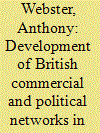

|
|
|
|
|
| Publication |
2011.
|
| Summary/Abstract |
This paper examines the growth of the British commercial communities in the Straits Settlements in the first half of the nineteenth century. It describes how they emerged as a coherent commercial and political interest group, separate from the Indian empire, with their own network of allies and commercial partners in Britain. As such, the Straits merchants emerged as a significant political lobby in their own right. It contends that in the process, they revived earlier notions of Southeast Asia as a discrete geographical region, in which political and ethnic diversity was bridged by the flourishing of maritime commercial networks.
|
|
|
|
|
|
|
|
|
|
|
|
|
|
|
|
| 2 |
ID:
169319
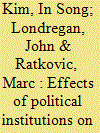

|
|
|
|
|
| Summary/Abstract |
We present a model of political networks that integrates both the choice of trade partners (the extensive margin) and trade volumes (the intensive margin). Our model predicts that regimes secure in their survival, including democracies as well as some consolidated authoritarian regimes, will trade more on the extensive margin than vulnerable autocracies, which will block trade in products that would expand interpersonal contact among their citizens. We apply a two-stage Bayesian LASSO estimator to detailed measures of institutional features and highly disaggregated product-level trade data encompassing 131 countries over a half century. Consistent with our model, we find that (a) political institutions matter for the extensive margin of trade but not for the intensive margin and (b) the effects of political institutions on the extensive margin of trade vary across products, falling most heavily on those goods that involve extensive interpersonal contact.
|
|
|
|
|
|
|
|
|
|
|
|
|
|
|
|
| 3 |
ID:
182855
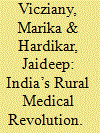

|
|
|
|
|
| Summary/Abstract |
This article explores the potential conflict between allopathic (‘Western’) medicine and rural beliefs in village goddesses, given that each demands blood for diagnostic purposes and sacrifices, respectively. Our objective is to understand the experiences and attitudes of rural residents to blood tests, blood donations and blood transfusions. We explore the specific question of the extent to which poor villagers in Wardha district, Maharashtra, might be supportive of or opposed to point-of-care blood testing at their doorsteps. We began by asking them about their religious practices, including the sacrifice of animals and offerings of blood to deities. Such values could affect their perspectives on human blood and allopathic medicine. After that, we asked whether they had any fears about modern medical treatments and technologies—such fears might be driven by anxieties about angering goddesses if human blood was used for non-sacred purposes. Our investigations took us into an inquiry about villagers’ experiences with hospitals. We came to realise that for villagers, despite the costs of hospital diagnosis and treatment, hospitalisation had become a source of new knowledge about blood. And, finally, we asked villagers what they thought about the value of point-of-care blood testing at their doorstep. We were told that the high cost of hospital treatment means that villagers support technologies that can be used at their doorstep and work towards improving their health and longevity.
|
|
|
|
|
|
|
|
|
|
|
|
|
|
|
|
| 4 |
ID:
091373
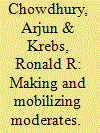

|
|
|
|
|
| Publication |
2009.
|
| Summary/Abstract |
Studies of counterterrorism have argued for the importance of bolstering, or "mobilizing," moderates in the confrontation with violent extremists. Yet the literature has not elucidated when states seek to mobilize moderates and marginalize extremists, how they do so, or when they prove successful. The received wisdom is that states should cultivate and strengthen moderate allies by reaching out to them. This approach, however, fails to grasp the political challenges confronting potential moderates, whose priority is to build and retain legitimacy within their political community. Inspired by network approaches, we maintain that moderates can more easily emerge when their political interactions with the authorities are relatively sparse. We further argue that the state's strategies, including crucially its rhetorical moves, can bolster the moderates' local legitimacy. At times, this will entail not reaching out to moderates but isolating them. Before moderates can be mobilized, they must be made, and the state's criticism, more than its love, may do much to help moderate political forces emerge. This article explains why mobilizing moderates is critical, when it is difficult, and how authorities can nevertheless play a productive role in moderates' emergence. We establish our theoretical framework's plausibility by examining two cases-India's ultimately triumphant campaign against Sikh extremists and Spain's gradual marginalization of Basque extremists. We then suggest what lessons these campaigns against ethnonational terrorism hold for the so-called War on Terror.
|
|
|
|
|
|
|
|
|
|
|
|
|
|
|
|
| 5 |
ID:
185000
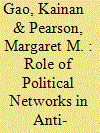

|
|
|
|
|
| Summary/Abstract |
Scholars have debated the degree to which China’s anti-corruption campaign is an instrument to conduct a political purge against political rivals. With a newly constructed dataset based on public information, we conduct a multilevel analysis on the publicized time probed individuals spend between the announcement of investigation and being sentenced (length of investigation). We find that higher ranking individuals as well as those who will receive harsher punishments are likely to experience shorter investigations, controlling for the amount of money involved. We also find limited evidence that political network membership is associated with the length of investigation. Being associated with Zhou Yongkang, a known political rival of President Xi Jinping, does not make the investigation significantly different given similar amounts of money involved in the corruption case. Association with other prominent party members (e.g., Ling Jihua, Liu Zhijun, etc.), however, increases the length of investigation. We explore possible interpretations for the variation in investigation times among different networks.
|
|
|
|
|
|
|
|
|
|
|
|
|
|
|
|
| 6 |
ID:
133813
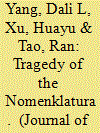

|
|
|
|
|
| Publication |
2014.
|
| Summary/Abstract |
We review James Kung and Shuo Chen's study, published in the American Political Science Review, on the causes of China's Great Leap Famine (1959-1961). Kung and Chen explain the variations in provincial leaders' radicalism on the basis of the career incentives facing the provincial First Secretaries. In this article, we question the validity of their basic assumptions and also uncover serious issues with the Kung and Chen dataset. We conclude that their empirical findings were based on faulty foundations. Our alternative hypothesis instead explains the dynamics of political radicalism during the Great Leap Forward in terms of the provincial leaders' political loyalty to Mao. Our findings point to the significance of political networks in influencing the behavior of elites and, by extension, political and socio-economic outcomes.
|
|
|
|
|
|
|
|
|
|
|
|
|
|
|
|
| 7 |
ID:
133310
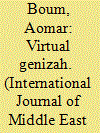

|
|
|
|
|
| Publication |
2014.
|
| Summary/Abstract |
After the establishment of the State of Israel, the Zionist narrative dominated the histories and historiographies of Middle Eastern and North African Jewries. Accordingly, Jews and Arabs were largely kept as distinct binaries divided by the intellectual walls that separated Middle East studies and Jewish studies programs. Local North African and Middle Eastern scholars also silenced or overlooked the Jewish dimension of Middle Eastern societies in the same manner that Israeli scholars ignored the historical connections between Arabs and Jews that existed both before and after 1948. The exclusive, sacred yet ebbing, nationalist paradigm has been plagued with historiographical fissures in recent decades, allowing a new wave of intellectual engagement by a young generation of Jewish and Muslim scholars who began to put the Jew and the Arab back into local and global histories formed through complex social, cultural, economic, and political networks.
|
|
|
|
|
|
|
|
|
|
|
|
|
|
|
|
|
|
|
|
|